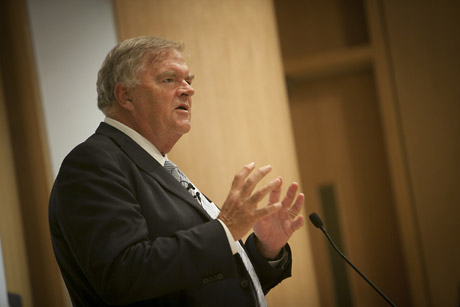Australian envoy lauds U.S. diplomacy in Southeast Asia
By Kara Beckman

The face of American diplomacy is changing – and the results could have an enormous impact on people in Southeast Asia and the Indo-Pacific region. Speaking on campus Sept. 10, the Australian ambassador to the United States said the recent shift in American attention to the region may prove crucial to its political development.
Kim Beazley focused on increased American diplomacy in Southeast Asia in the past few years. After nearly a decade of Australian encouragement for the United States to become more involved in Southeast Asia, Beazley stated, “President Obama’s leadership has turned the key decisively … over the past few years to get the United States involved in the region.”
The change in American diplomacy has been caused by the recent economic rise of many Southeast Asian countries. As the region becomes richer, many of these nations can afford weapons systems, and more money is spent on defense in Asia than in Europe, Beazley said. Tensions have increased between some nations because of unsettled land and maritime boundaries.
These tensions have caused the United States to shift its attention from the Middle East to Southeast Asia, Beazley said, and overall the reaction to the change has been positive. “The American presence is considered legitimate,” he noted. “Nobody [in the region] hates the United States.”
The acceptance of American diplomacy in Southeast Asia has hinged chiefly on United States engagement in the Middle East, primarily due to religious reasons. The largest Muslim power in the world is actually Asian, not Middle Eastern, Beazley noted. Therefore, “what happens to Muslims in the Middle East matters to Asians.”
There is an economic reason as well. Currently, Southeast Asia makes up 70 percent of the Middle Eastern oil market, and in a few years it will reach 90 percent. Beazley said he was concerned that the United States does not fully grasp the importance of these ties: “Americans need to get their narrative right about the linkage between the Middle East and Southeast Asia.”
Middle Eastern politicians are unhappy about the American shift in diplomatic focus. “They’re afraid that the United States is going ‘off the reservation,’” Beazley said, and there has been an effort to pull the United States back into Middle Eastern affairs. “The possibility of settlement in some areas, particularly Palestine, is slightly better now than it has ever been before,” he said.
While some politicians are worried about U.S.-China relations as America becomes more involved in the region, Beazley noted that “America is not treating China like an inferior,” and “China recognizes that it is limited in the degree to which it can rival America.” What is most important is that America has proven itself able to “settle affairs with some level of peace,” and so far, according to Beazley, it is playing its diplomatic role in Southeast Asia “extremely well.” “America is cooperating and operating in the region in a way that is defining the region’s politics,” he said.
Beazley’s talk, “Rebalancing in a World Clamoring for American Attention,” was part of the Mario Einaudi Center for International Studies’ Foreign Policy Distinguished Speakers Series.
Kara Beckman ’17 is a writer intern for the Cornell Chronicle.
Media Contact
Get Cornell news delivered right to your inbox.
Subscribe